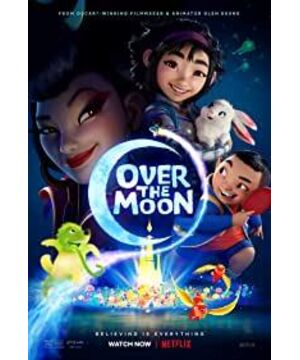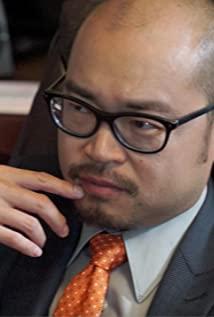On October 23, Netflix released an animation "Over the Moon" based on the Chinese mythology "Flying to the Moon." The interesting thing about this film is that it is different from the Chinese film market which explicitly or implicitly pointed out that after the founding of the People’s Republic of China, it is not allowed to become a fine film or to make a ghost film. This is a story that grafts science to mythology. If the filming is made by a Chinese director, there are only two options, one is to make the ancient myths of Nezha and Jiang Ziya, and the other is to make the modern science fiction stories of The Martian Rescue, and there is absolutely no possibility of grafting. There are historical reasons for this. For Western science and literature, science fiction stories themselves are modern myths and new folk customs in modern technology. This transition is very natural. For example, Neal Gaiman's "American Gods" and Liu Yukun's "Happy Hunting". The difference is that the former points out that science is squeezing the space for the gods to live, while the latter tells the story that happened naturally after the birth of science. The fox demon became a steampunk mechanical fox. In this regard, Japanese folklore and mythology have similar manifestations. Japanese Yokai Studies also pointed out that the birth of science has squeezed the living space of Yokai. This is exactly what Feyerabend, the philosopher of science has always emphasized, that science is obliterating human imagination, making the space for non-scientific content constantly squeezed. Another example is Hayao Miyazaki’s "Spirited Away" in popular culture or the recent "Digimon: The Ultimate Bond Evolution" (actually the end of childhood, see my film review) Also pointed out that only a child with an innocent imagination can he see the animistic world. At this time, the birth of science has also become a metaphor, a rite of passage for mankind. The reasons behind this are extremely complicated. In addition to historical reasons (the country was opened by strong ships and guns) and practical reasons (the current period of China's march toward modernization), it also reflects a certain cultural transplantation dislocation. Hermann Bauschinger Bausinger) pointed out in "Folk Culture in the Technological World" that technology will give birth to new folk customs, such as our New Year greetings and red envelopes have been replaced by smart phones today, but it seems that China is currently acceptable to this extent. Generally speaking, we are accustomed to returning the ancient to the ancient and the modern to the modern. We have naturally broken our own continuity and are not able to accept modern adaptations, especially from heterogeneous cultures (if you don’t like Western cultural perspectives, think If that is a kind of Western-centrism, then the scientific and cultural perspective is naturally lacking) to look at our culture, which presents a certain contradiction. But in the field of research, it presents another scene. For example, in the field of history of science and technology, the mainstream view of most scientists and historians of science is either that there is no modern Western science in ancient China, or that modern science is used to interpret ancient knowledge systems; A small number of tolerant historians of science adhere to the perspectives of anthropology and sociology, trying to restore the development of ancient Chinese local knowledge. Generally speaking, the division of disciplines of modernity is introduced from the West. Most disciplines, especially those with similar knowledge in the past, face the problem of conflict between the original knowledge and the Western knowledge system, such as philosophy, literature, history, and art. To bear the brunt, his concept is similar to the situation faced by the field of science and technology history. But after all, scholars who are tolerant are still in the minority. Most scholars still face the situation of the beginners in the late Qing Dynasty. One choice). Only a few scholars clearly see that the expansion of Western civilization is the expansion of a set of worldviews represented by science, finance, and the legal system. It is a process of merging one civilization with another, rather than The process of replacing one civilization with another is the process of localizing and localizing science and technology. From this perspective, globalization is a false proposition, because technology itself is closely related to the localized geographical environment and cultural environment. There is no technology that is out of the environment of use. Today we try to use universal scientific concepts to promote technology. It is essentially ridiculous and unworkable. Just like science itself, we often say that “science has no borders, and scientists have other Like the motherland, it separates the so-called objective knowledge from the market and society, which runs counter to Schumpeter’s innovative ideas. Not to mention, from the perspective of philosophy of science and philosophy of technology, it is simply untenable. Under this trend, China has adopted a cutting method to deal with its cultural heritage. The ancients belong to the ancients, and a completely ancient story can be told, but the stories of pseudoscience and feudal superstition cannot appear in modern society (except For the aforementioned reasons, there are also issues of scientific legitimacy and Marxist government legitimacy). Pseudoscience and feudal superstition here are political discourses, not scientific discourses. There is no feudal superstition of Chinese concepts in the West. The purpose of this isolation is to protect China's traditional culture without hindering the expansion of modern scientific discourse, but it does not realize that the embodiment of modernity is not only science or technology, but literature itself is modernity. Just as the early "Ne Zha Na Zha" was a reaction to class struggle, "The Devil Boy Ne Zha" was a reaction of contemporary society, and had nothing to do with the image of ancient mythology, but this kind of creation and creation was encouraged, on the contrary , If Nezha came to modern society, or like the early cult film "Guan Gong vs. Aliens", it would not be encouraged by the market and the government. Most viewers would feel that ancient Chinese characters came to the modern society. It’s a very weird scene (of course, part of the reason is that many ghost and horror films have to be released in the shell of science fiction, which also aggravates the nausea of the audience), but forgets that the stories of Harry Potter or bloggers are actually Such. This is the meaning of "Flying to the Moon". I have seen many people compare it with "Frozen". Of course, this is ok. For example, both are cartoons about singing and dancing, and both are stories of girls growing up. The cultural motif or source of "Frozen" has been modernized (although "Frozen" is more of a value concept, especially female consciousness, "Flying to the Moon" is a technical setting). And I would like to compare it to "Spirits of the Mind", because both come from the folklore of their respective cultural backgrounds. "Flying to the Moon" is a Chinese myth, and "Spirits of the Mind" is a typical Western fairy tale, and then use modern Technology is used for packaging. The former is the protagonist's self-made spaceship, and the latter is the personification of emotions and repackages contemporary psychology hypotheses with ancient element theories. Of course, the processing of "Flying to the Moon" certainly cannot satisfy the Chinese audience. As described above, they are very contradictory. On the one hand, they feel that they do not have such imagination (how can the Yunsheng beast appear in the solar system? It is beyond the imagination of the Chinese people, because there was no concept of space in ancient China; the moon phase can not only express mood, but also become a clock, because mechanical clocks have been introduced to China in the 17th and 18th centuries), at this time they It brings in the so-called guest perspective of anthropology (that is, jumping out of the perspective of the native, non-Chinese), and on the other hand, it feels that foreigners are full of gaze on their own imagination (how Tengu is a cute Chow Chow; Chang'e Why do you speak English and sing English songs; what the hell is the costume; why the core is still a Western-style family carnival), at this time they bring What I enter is the so-called thematic perspective of anthropology (that is, the perspective of the native, the perspective of the Chinese). However, for foreigners, this kind of subjective and objective environment is just the opposite. At this time, the foreigner’s objective perspective (non-national perspective) is exactly the Chinese perspective. If you imagine yourself as a Chinese, the subjective perspective (national perspective) is exactly the opposite. Perspective) It is the non-Chinese perspective, the Westerners’ curiosity and fear of Eastern mysticism. From the perspective of the subject and object of foreigners, there will be a country like Leibniz that regards China as the king of philosophy, and it will also appear. I think that Chinese people are like the terrifying imagination of Fu Manchu. As far as this film is concerned, I want to be sure that most of the former are. But at least it reflects that different audiences have completely different positions in their understanding of the film from the beginning. Of course, this still has to answer another question, why this year's live-action version of "Mulan" is not good, while "Flying to the Moon" is not bad. In fact, this problem is very simple. The former is completely incompatible with the creative rules, just the stacking of various elements, and the development of the story is not logical and has no curve. The latter is not the case. The latter’s emotional motives are complete. The mother must die is a routine in Western stories, which causes the protagonist’s growth problem. In this film, this problem is also faced by the gods (BOSS). It seems that the villain is creating difficulties for the protagonist. In fact, the two are facing the same situation. In the end, they help each other to reach an understanding. Both of them get out of the predicament. Not only do they have the idea of the unity of nature and man in China, but also the modern female cross-class mutual help. Thought. Some unreasonable scenes just need to return to the historical context of China to understand. For example, the tengu at the beginning is a cute Chow Chow. There are many reasons. The first Chow Chow also appeared at the end of the film. This is the dog raised in the protagonist’s house. My own dog has become a star in the sky, which can be regarded as the Western concept of large universe and small universe, and it can also be said to be the concept of the unity of nature and man in China. Second, the Chow Chow is also one of the traditional Chinese dog breeds, which is often seen in Chinese pictures. The fine dog has been a hunting dog since at least the Song Dynasty, and the Chow Chow has been a pet dog breed since at least the Tang Dynasty. As a folktale, it is much easier to tell a familiar fine dog than the noble Chow Chow. However, the Chow Chow was domesticated in line with the aforementioned The plot is treated as a pet; third, Chow Chow appears when telling the Tengu, accompanied by meteors and comets. This is the same as the understanding of ancient Chinese astronomy and astrology. The Tengu represents the comet, and the auspicious meaning of the Chow Chow is the original meaning of the Tengu. The crime prevention is the same, and also in line with the harmonious atmosphere of the family carnival. In the climax part, the younger brother walked through the wall. This scene also appeared before, but failed. This is the Laoshan Taoist from Chinese legend. Those who really understand Chinese Taoism should know that the premise of magic is pure mind and attainment. The realm of the unity of nature and man, the front brother showed the protagonist The motive was impure and ineffective during the swing. This is also the reason why Sun Wukong was driven down the mountain after showing the seventy-two changes to the brothers in "Journey to the West". It was because the heart was overwhelming, and the younger brother was so pure to save his sister. The heart of love, but it cannot be explained according to the quantum mechanics (wave function or quantum tunneling) that everyone loves now. In short, as I said before, we should see and accept such a trend that the implications of globalization are by no means a set of unified standards, but the localization of similar standards, which is the fusion of two cultures. Just as many sci-fi works began to mix English, Chinese or Japanese into a world language. This is the so-called gentleman in ancient China who is harmonious but different, and it is also the life finds its way in the West.
View more about Over the Moon reviews











